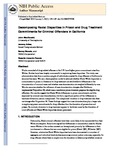Decomposing Racial Disparities in Prison and Drug Treatment Commitments for Criminal Offenders in California
| dc.contributor.author | MacDonald, John | |
| dc.contributor.author | Arkes, Jeremy | |
| dc.contributor.author | Nicosia, Nancy | |
| dc.contributor.author | Pacula, Rosalie Liccardo | |
| dc.date.accessioned | 2015-02-04T23:20:10Z | |
| dc.date.available | 2015-02-04T23:20:10Z | |
| dc.date.issued | 2014 | |
| dc.identifier.citation | J Legal Stud. 2014 January 1; 43(1): 155–187. doi:10.1086/675728. | |
| dc.identifier.uri | https://hdl.handle.net/10945/44459 | |
| dc.description | J Legal Stud. Author manuscript; available in PMC 2015 January 01. | en_US |
| dc.description | The article of record as published may be found at http://dx.doi.org/10.1086/675728 | en_US |
| dc.description.abstract | Blacks convicted of drug-related offenses in the U.S. have higher prison-commitment rates than Whites. Studies have been largely unsuccessful in explaining these disparities. This study uses administrative data from a random sample of individuals arrested for drug offenses in California to examine this issue. We use a decomposition model to estimate whether Black-White disparities in commitments to prison or diversions to drug treatment are attributable to differences in the characteristics of criminal cases and whether case characteristics are weighed differently by race. We also examine whether the influence of case characteristics changes after California implemented Proposition 36, which was a mandatory prison diversion program for eligible drug offenders. Our results suggest that Black-White differences in prison commitments are fully explained by criminal case characteristics, but that a significant portion of the differences in treatment diversions remain unexplained. The unexplained variation in drug treatment also does not change after Proposition 36. These findings suggest that case characteristics play a larger role in explaining prison commitments for drug offenders than the discretion of prosecutors and judges. By contrast, diversion to drug treatment appears to be driven more by the discretion of court officials and Black-White disparities remain prominent. | en_US |
| dc.rights | This publication is a work of the U.S. Government as defined in Title 17, United States Code, Section 101. Copyright protection is not available for this work in the United States. | en_US |
| dc.title | Decomposing Racial Disparities in Prison and Drug Treatment Commitments for Criminal Offenders in California | en_US |
| dc.type | Article | en_US |
| dc.contributor.department | Graduate School of Business & Public Policy (GSBPP) |





